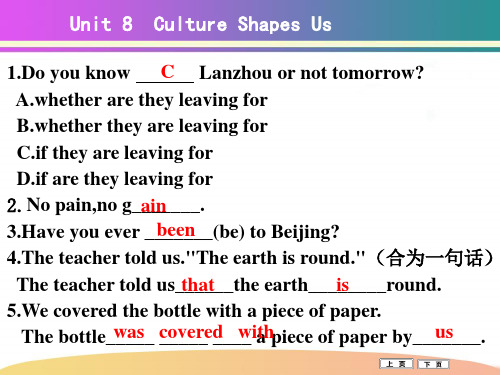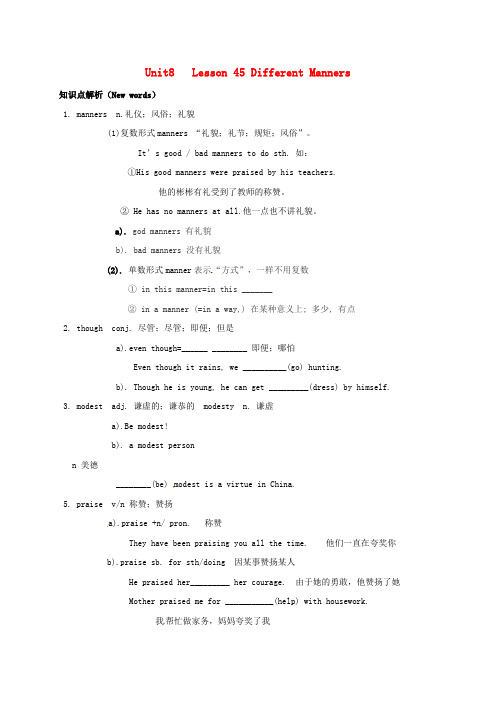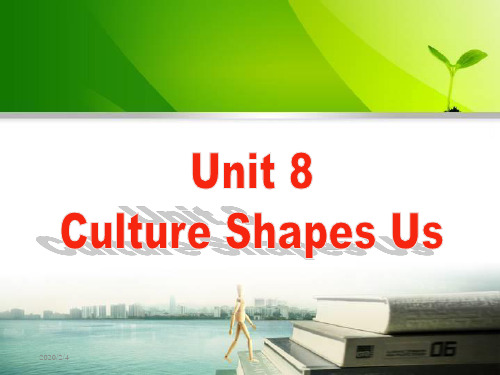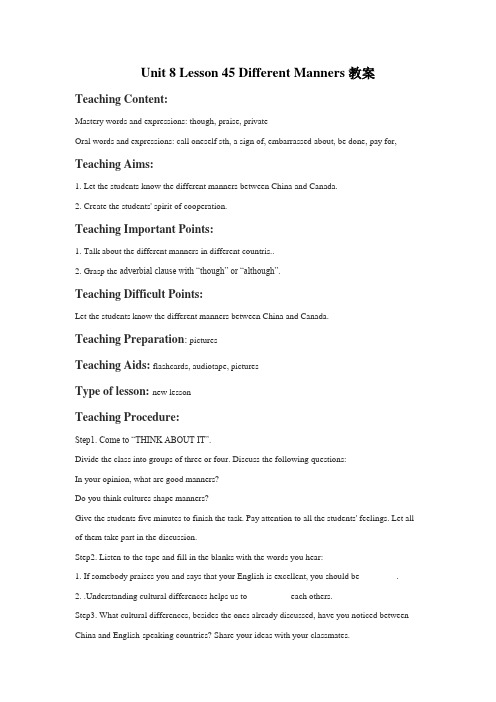冀教九年级英语Unit 8 Lesson 45 Different Manners 课件
冀教版英语九年级Unit_8_Lesson_45_Different_Manner (1)

24.我和妹妹轮流做家务。
My sister and I My mother
take turns doing
extra
the housework.
money
25.妈妈很少给我额外的钱。
seldom
gives
to me.
Unit 8
Culture Shapes Us
辨析offer和provide 1.The local people like that Italian restaurant because it
Unit 8
Culture Shapes Us
Read the first two paragraphs and answer the questions. How long has Wu Zhou lived in Canada?
He has lived there for twenty-three years.
D
es
both delicious food and good service. B.wants
C.shares
D.provides
2.The little boy crowded bus. A.lent C.took
B
his seat to an old lady on the
B.offered D.brought
Unit 8
Culture Shapes Us
Unit 8
Culture Shapes Us
1.---- Your English is good. have learned (learn) it ---- Thank you. I __________ for three years. manners 2. You should have good _______ (manner)all the time. private school. 3.这是一个私立学校。This is a ______ 4. 我们赞美他的诚实。 praised him ____ for his honesty. We _____ 5.他已经离开泸州三个月了。 has ____ been ____ away from Luzhou for He ____ three months.
九年级英语全册Unit8Lesson45DifferentManners学案无答案新版冀教版

Unit8 Lesson 45 Different Manners知识点解析(New words)1. manners n.礼仪;风俗;礼貌(1)复数形式manners “礼貌;礼节;规矩;风俗”。
It’s good / bad manners to do sth. 如:①His good manners were praised by his teachers.他的彬彬有礼受到了教师的称赞。
② He has no manners at all.他一点也不讲礼貌。
a). god manners 有礼貌b). bad manners 没有礼貌(2). 单数形式manner表示“方式”,一样不用复数① in this manner=in this _______② in a manner (=in a way,) 在某种意义上; 多少, 有点2. though conj. 尽管;尽管;即便;但是a).even though=______ ________ 即便;哪怕Even though it rains, we __________(go) hunting.b). Though he is young, he can get _________(dress) by himself.3. modest adj. 谦虚的;谦恭的 modesty n. 谦虚a).Be modest!b). a modest personn 美德________(be) modest is a virtue in China.5. praise v/n 称赞;赞扬a).praise +n/ pron. 称赞They have been praising you all the time. 他们一直在夸奖你b).praise sb. for sth/doing 因某事赞扬某人He praised her_________ her courage. 由于她的勇敢,他赞扬了她Mother praised me for ___________(help) with housework.我帮忙做家务,妈妈夸奖了我c). He won praise ________ his modesty. 他因自己的谦虚博得了夸奖d). in praise of…赞扬,称赞6. private adj.私人的;私有的a). in private 私密地;私下地We can only talk about this matter _______ __________.咱们只能私下谈论这件事b). Don’t repeat what I’ve told you to anyone. It’s private.不要向任何人转述我告知你的事,它是私密的。
新冀教版九年级全一册英语Lesson 45 Different Manners课件

第四页,共二十六页。
新课讲解
In China,being modest is a virtue. If someone praises you and says that your English is excellent,you should be modest and say,“No,no. My English is still poor.” But in North America,this is usually a sign of being weak and not confident. You should just say,“Thank you.”
In Canada,people only ask children about their age. It's not polite to ask an adult's age.
They think it is private. But this is mon in many places in China.
Chinese culture.
My name is Wu Zhou. I have lived in Canada for twentythree years. In Canada, I call myself Joe Wu. Joe is an English name
that sounds like Zhou.
In both China and North America,it is polite to offer an elderly person a seat on the bus. In North America,however, an elderly person may feel embarrassed about being offered a seat.
冀教版九年级英语 Unit 8 Lesson 45《Different Manners》 课件 (共39张PPT)

3. They asked him to _p_a_y__fo_r__the damage, but he refused.
4. Don’t talk about other people’s _p_r_i_v_a_te__ things. It’s not polite.
5. Jack is a _m__o_d_e_s_t _ man who is admired by many people.
2020/2/4
【运用】根据汉语意思完成英语句子, 每空一词。 1. 尽管下着雨,他们还在外面玩。
A__lt_h_o_u_g_h__/_T_h_o_u_g_h__ it’s raining, they’re still playing outdoors.
2. 尽管她妈妈不在那儿,但她爸爸在。 Her mother isn’t there, __b_u_t__ her father is.
7. elderly adj. 上了年纪的;较老的
2020/2/4
8. guest n. 客人 e.g. If the guest’s address is upside down, the postman could be angry. 如果客人的地址上下颠倒,邮 递员是很生气的。
9. extra adj. 额外的;另外的
2020/2/4
4. What cultural differences, besides the ones already discussed, have you noticed between China and English–speaking countries? Share your ideas with your classmates.
冀教九年级英语Unit 8 Lesson 45 Different Manners 教案

Unit 8 Lesson 45 Different Manners教案Teaching Content:Mastery words and expressions: though, praise, privateOral words and expressions: call oneself sth, a sign of, embarrassed about, be done, pay for, Teaching Aims:1. Let the students know the different manners between China and Canada.2. Create the students' spirit of cooperation.Teaching Important Points:1. Talk about the different manners in different countris..2. Grasp the adverbial clause with “though” or “although”.Teaching Difficult Points:Let the students know the different manners between China and Canada.Teaching Preparation: picturesTeaching Aids: flashcards, audiotape, picturesType of lesson: new lessonTeaching Procedure:Step1. Come to “THINK ABOUT IT”.Divide the class into groups of three or four. Discuss the following questions:In your opinion, what are good manners?Do you think cultures shape manners?Give the students five minutes to finish the task. Pay attention to all the students' feelings. Let all of them take part in the discussion.Step2. Listen to the tape and fill in the blanks with the words you hear:1. If somebody praises you and says that your English is excellent, you should be ________.2. .Understanding cultural differences helps us to _________ each others.Step3. What cultural differences, besides the ones already discussed, have you noticed between China and English-speaking countries? Share your ideas with your classmates.Step4. Read the text and tell the main idea of the text in the students' own words.Let the students speak in front of the class. Encourage them not to be shy when they stand there. Give the students chances to speak loudly in front of the class.Step5. Encourage the students to ask more questions about this part.Divide the class into groups of three or four to finish the task. Ask all of the students to take part in the discussion.Step6. Homework1. Finish off the exercises in the textbook on page 119.2. Go on the next reading in the student book.。
冀教版九年级下册英语课件Unit8Lesson45DifferentManners

基础巩固练
8. He felt very embarrassed for ___ti_p_p_i_n_g__ (tip) the waitress only one dollar.
基础巩固练
9. Can you see the__d_i_ff_e_r_e_n_c_e_s_ (different) between the two pictures?
习题链接
提示:点击 进入习题
1 though 2 praise 3 private 4 guests 5 manners
基础巩固练
6 Canadian 7 elderly 8 tipping 9 differences 10 waiter
答案呈现
11 D 12 C 13 C 14 D 15 C
习题链接
20. His _g_o_o_d_m__a_n_n_e_r_s_ show that he has ever got good education.
基础巩固练
五、连词成句。 21. different, it’s, to, experience, cultures, two, interesting
基础巩固练
30. He spent twenty dollars on this book.(改为同义句) He ___p_a_i_d__ twenty dollars ____fo_r___ this book.
能力提升练
一、 根据短文内容或所给提示,在文中的空白处填入 正确的词。 Good manners reflect good qualities of a person. Good
terrible time at the beginning.
冀教版九年级英语下册Unit8Lesson45DifferentManners教学设计
③In China if someone praises you, you should be modest,butin Canada you should just say "Thanks".
Or we can give all to each group, but each student only has parts of it, they should finish their parts first and then make the whole passage. We can have a competition among the groups.)
2.First-reading
①Read the passage and match the behaviors with the correct country.
②Read the passage, find out the topic sentence and then finish the chart with the group members.
Deal with the exercises and test the students’ mastery about the knowledge and the different manners betweenChinaandCanada.
Summarize
the using of “though” and “although”.
Give Ss different parts of the sentences, they should finish the sentences first and then try to make them together to get the whole sentences.
冀教版英语九年级全一册 Unit 8:Lesson 45 Different Manners 教案
冀教版九年级Lesson45:Different Manners Title Lesson45 Different MannersTeaching aims Knowledge1.To learn about different manners in different countries.2.To learn to use “though” and “although” in adverbialclause.Ability1.To know about different country has different manners andtry to be polite.2.To be polite and cultured while going abroad or being withforeigners.EmotionTo help the students understand the world better and behavebetter.Project Content AimsTeaching procedures Step1: Lead-in and warm upT: Look at these pictures. They describe cultures in different countries. Try to divide them into two parts.Motivatethestudents.Step2: Listening and Reading1. Listen to the first two paragraphs and answer the questions:How long has Wu Zhou lived in Canada?Why doesn't he feel Canadian?2.First-reading①Read the passage and match the behaviors with thecorrect country.②Read the passage, find out the topic sentence and thenfinish the chart with the group members.Topic sentence: Understanding cultural differencesStudentscanunderstandbetterthroughlisteningand reading.Get to knowmore aboutthe contentand keyinformationabout thelesson.really helps us to understand each other, live together andwork together.Makestudentsunderstandthe textbetter.Step3: Practice1.Have a memory test about the text! (Team work)Give students different parts of the sentences, they shouldfinish the sentences first and then try to make them togetherto get the whole sentences.(We can give different groups different parts of it, and thenlet them to share it together and make the whole passage.Or we can give all to each group, but each student only has parts of it, they should finish their parts first and then make the whole passage. We can have a competition among the groups.) Deal with the exercises and test the students' mastery about the knowledge and the different manners between China and Canada.2.Adverbial clause with “though” and “although”.1) Read the sentences again and pay attention to theunderline words.①Though Wu Zhou has lived in Canada for 23 years, he still doesn't feel Canadian.②Although Canadian culture is different from Chinese culture, he has many good friends in Canada.③In China if someone praises you, you should be modest, but in Canada you should just say "Thanks".“Although/ though” and “but” are used when there is a contrast between two objects. You shouldn’t use “but” and “although” together.2) Finish the Exercise Two on Page 119. Summarize the using of “though”and “although”. Deal with the exercises.Step 4:Extensive reading:T: Do you know any table manners?T: Read the item and list the Dos and Don’tsTable Manners for Children Dos Don’ts Students can get more table manners with extensive reading.Step5: DiscussionTalk about other manners they know in different countries. First they write down what they know on the paper, then share them with other groups.E.g.: Practice talking about different cultures. From discussion students can know more about different cultures. This will help them to do better with others.Home- work 1.Make a project about different manners in one of the countries you’d like to travel to.2. Give us a report about it next time.3. Finish the exercises on page 119.Board Design Lesson 45 Different Manners。
冀教版英语九下Unit 8《Lesson 45 Different Manners》ppt课件
and Paris.
2. This is probably because North American manners and Chinese manners are so different. 这很可能是因为北美洲的礼节与 中国的理解太不一样的原因。
句中的because North American ... 是表语从句,用在
1. Write a passage about this unit. 2. Preview next lesson.
Lesson 45
Different Manners
Warming up
In your opinion, what are good manners? Do you think cultures share manners?
New words
manners modest praise elderly extra tip though virtue private guest waiter
Ⅱ.根据所给的汉语完成下面的句子,每空一词。
1. 我们在中国居住了三年的时间了。 have lived We _________ ________ in China for three years. 2. 问别人年龄是不礼貌的。 It’s not polite _________ _________ _________ to ask other’s age. 3. 你们可以称呼他王先生。 call him You can _________ _________ Mr. Wang.
系词be后作表语,注意要使用陈述语序。
e.g.
These are what they bought for me.
3.In both China and North America, it is on the bus. 在中国和北美洲,在 公共汽车上给年长者让座是有礼貌的。
冀教版九年级英语 Unit 8 Lesson 45《Different Manners》(共24张PPT)
讲解来自《点拨》
考向二 pay的用法: pay sb.付款给某人 eg:Have you paid the doctor yet? 医生的酬金你付了吗? pay sb.+钱+for sth.给某人钱买某物 eg:I paid the shopkeeper 10 yuan for the
book. 我向店主付了十元钱买这本书。
take turns to do /take turns dong pass sth to sb cultura money
Main Sentences
1,Joe is an English name that sounds like Zhou. 2,I have lived Canada for twenty-three years. 3,Though I have lived here for a long time, I still don't feel Canadian. 4,If someone praises you and says that your English is encellent,you should be modest. 5,It's not polite to offer an elderly person a seat on the bus. 6,They may take turns paying for the meal.
Unit 8 Culture Shapes Us
Lesson 45 Different Manners
RReevviiesiwon
• 爱屋及乌 • 有志者事竟成 • 好的开始是成功的一半 • 不要小事聪明,大事糊涂 • 事实胜于雄辩 • 众人拾柴火焰高
教是学否目标
- 1、下载文档前请自行甄别文档内容的完整性,平台不提供额外的编辑、内容补充、找答案等附加服务。
- 2、"仅部分预览"的文档,不可在线预览部分如存在完整性等问题,可反馈申请退款(可完整预览的文档不适用该条件!)。
- 3、如文档侵犯您的权益,请联系客服反馈,我们会尽快为您处理(人工客服工作时间:9:00-18:30)。
Fill the blankets with the words or phrases in the box
Pay for praise take turns modest private
elderly adj. 年长的
guest n.客人America n.美国
call A B 把A称为B
When you call me European, I say yes.
当你叫我欧洲人的时候,我说是。 Why do I call it dreaming?.
我为什么把它叫做梦想呢?
a sign of 一个标志
How you manage and cope with change is a sign
of your professionalism and maturity. 如何处理和应付变化是你的职业特性和成熟的标志。
embarrassed about 对…感到尴尬
This can make them nervous or embarrassed
about speaking English in public.. 这可能导致他们在公众场合说英语感到紧张或尴 尬。
pay for 支付
All this may be the price we pay for progress.
Homework:
1. Remember the new words and phrases.
2. Read the text again and try to retell it in English.
Thank you!
Pay for praise take turns modest private
4. Don’t talk about other people’s ___ things. It’s not polite. 5. Jack is a _______ man who is admired by many people.
1. We should ____ little Debbie for her
courage.
2. It’s long away. We can ____ driving. 3. They asked him to ____ the damage, but he refused.
Fill the blankets with the words or phrases in the box
Unit 8 Lesson 45 Different Manners
Free Talk
1. In your opinion, what are good
manners?
2. Do you think cultures shape manners?
New Words and Expressions
这一切都可能是我们为进步付出的代价。 Must I pay for my cancel? 我需要为我的取消付款吗?
Let’s Do It!
What cultural differences, besides the ones
already discussed, have you noticed between
